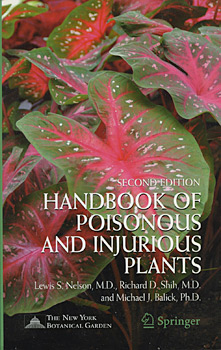
BACK COVER #
In the 20 years that have passed since the publication of the first edition, both Poison Control Centers and Emergency Departments have witnessed an expansion in the number and variety of poisonings caused by toxic plants. At the same time, there is a proliferation in the diversity of plants in our gardens and homes, continually expanding the range of possible consequences from exposure to toxic plants.This second edition of the Handbook of Poisonous and Injurious Plants is created to assist the clinician in the initial response to the needs of a child or adult exposed to a poisonous or injurious plant. It lists common plants that might lead to the development of the symptom complex and describes the mechanisms of action of the implicated toxin, additional clinical manifestations, and specific therapeutics for each presentation. It has methodically enhanced the previous edition's botanical rigor with insights from both pharmacognosy and clinical medicine to make it a truly comprehensive source.
With its thorough references and full-color photos of hundreds of potentially toxic and injurious plants inside and outside the home, anyone who has an interest in plants will find this book useful outside in the garden or out in the wild.
This book will fascinate botanists, horticulturists, and naturalists as well as hikers, gardeners, and all those who simply enjoy the wonders of nature and the great outdoors!
With Foreword by Lewis R. Goldfrank, MD and Introduction by Andrew Weil, MD
BLURBS #
"The Handbook of Poisonous and Injurious Plants, rich in visual images, emergency medical information, botanical descriptions, and scientific references, is the easiest to use and most comprehensive handbook of its kind available today. It will be of great value to physicians, naturalists, horticulturists, parents of small children, pet owners, and all those who interact with plants and the landscapes -- both indoors and outdoors -- in temperate, desert, tropical, and subtropical habitats throughout the year. This book is designed to become a well-thumbed addition to libraries, classrooms, and personal bookshelves. The authors are to be congratulated for producing such a useful, portable, and elegant guidebook to the plant toxins that are all around us."-- Peter H. Raven, President, Missouri Botanical Garden, St. Louis, MO, USA
"The Handbook of Poisonous and Injurious Plants by Balick, Nelson and Shih is a thoroughly revised and updated ... The new Handbook authors include a botanist and 2 physicians in the active practice of medical toxicology and emergency medicine. The resulting collaboration has resulted in a remarkable reference work - a slim, but lavishly illustrated handbook of only 300-plus pages that provides a detailed, medically oriented approach to plant poisonings and their management. The Handbook of Poisonous and Injurious Plants is an indispensable resource for every poison center and emergency department book shelf. Many pediatricians and emergency physicians will find it an invaluable addition to their personal libraries as well. "
-- Fred M. Henretig, MD, Director, The Children's Hospital of Philadelphia' s Poison Control Center, Philadelphia, PA, USA
"This second edition of the Handbook of Poisonous and Injurious Plants is a remarkable improvement to a great book. It is much more logical and clinically relevant use of botany and medicine. Its new graphics and formal structure increases its value for the lay person and clinician."
-- Lewis R. Goldfrank, Director, Department of Emergency Medicine, New York University School of Medicine, Bellevue Hospital Center, New York, NY, USA


